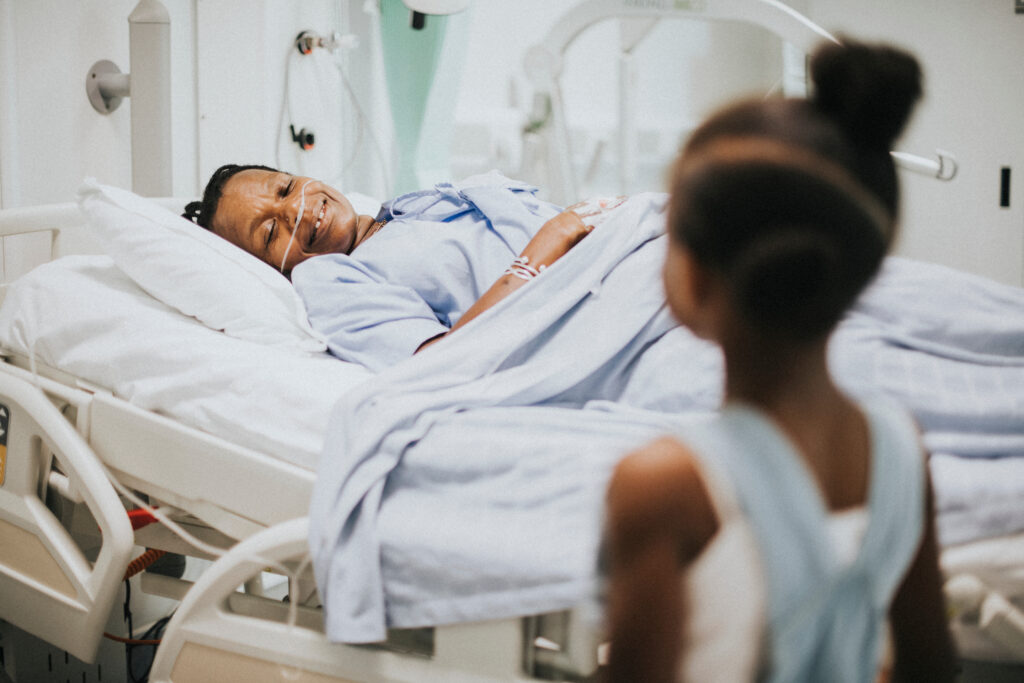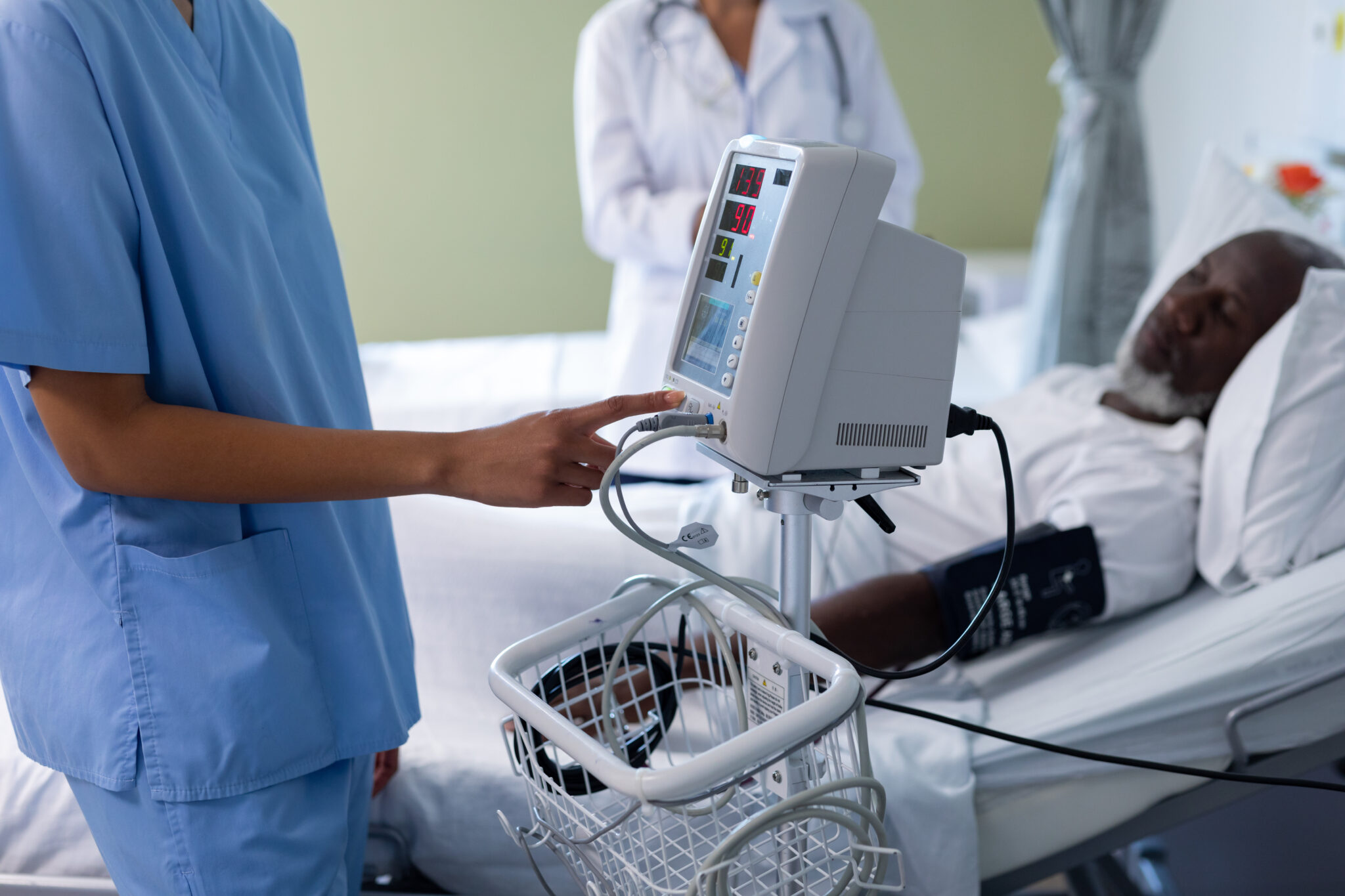As a family nurse practitioner and cardiac clinical nurse specialist with over 25 years of experience, I’ve been on both sides of healthcare. I’ve seen countless patients experience life-threatening complications, and I’ve also been that patient, fighting for my life when my body started to fail. More importantly, I’ve been the daughter advocating for my mother when her condition was worsening, while her healthcare team wasn’t responding fast enough. These experiences have profoundly shaped how I view patient advocacy and the importance of recognizing early warning signs of clinical deterioration.
I’m sharing this story not just as a nurse, but as someone who’s been in your shoes, sitting in that hospital bed or at the bedside of a loved one, wondering, “Is something wrong? Why aren’t they doing more?” I want to encourage you to ask questions, call or Facetime your family so they can join the conversation with your nurses and doctors, and speak up when things don’t feel right. This is your health or the health of someone you love. Don’t be afraid to ask for simple explanations:
- What’s changing?
- What does it mean?
- What’s happening?
- What are we doing about it?
- And if nothing, WHY?
Healthcare professionals don’t always get it right. I don’t say this to undermine my colleagues, but it’s a reality we must face. Sometimes, signs of clinical deterioration get missed because a patient’s condition doesn’t fit the textbook definition, or staff is busy and overwhelmed. Other times, junior staff may notice something wrong but feel hesitant to speak up. And yes, sometimes there’s a breakdown in communication among the care team. None of this is intentional, but the consequences can be severe.
If you notice something concerning, speak to the nurse or doctor right away. Say, “I think something’s wrong. Can you explain what’s going on?” If your concerns aren’t being addressed, ask to speak to the charge nurse or ask for a rapid response. These are your rights as a patient or family member. You should expect clear communication and timely action in response to your concerns.
I Was Overlooked as a Patient and Began to Deteriorate!
Several years ago, I was admitted to Naval Medical Center San Diego after an allergic reaction to a common medication called Bactrim for a spider bite that had developed into an abscess. The initial reaction of hives and itching needed attention but shortly seemed to resolve after medication in the ER. However, I was admitted for observation and was placed in an isolation room at the end of a hallway on a medical-surgical (med-surg) unit for suspected MRSA in the wound. Something I thought was unnecessary but I would just wait out the wound cultures and not argue the point. Later that evening, after eating dinner that included pineapple, my allergic reaction flared up again, escalating into a severe and dangerous reaction called anaphylaxis.
At first, the symptoms were subtle—my tongue felt fat. Soon my throat felt tightness, I began itching all over, and started to wheeze and have difficulty breathing. I knew my body, and I knew something wasn’t right. A junior staff member, a Navy corpsman, believed me and tried to get help. Unfortunately, the more senior staff didn’t take my symptoms seriously. They were new staff, busy, overwhelmed, and no one wanted to go into the isolation room. Despite me starting to have audible wheezes, the pulse oximeter read 96% so they dismissed my symptoms.
As my condition worsened, it became clear that I was in a life-threatening situation. The corpsman who had spent the most time with me knew something wasn’t right. Against the charge nurse’s directions he went to ICU and asked the charge nurse then to come see me. By the time a senior ICU nurse arrived, I was close to respiratory failure. I was intubated and rushed to the ICU, but those crucial early warning signs had been missed. If action had been taken sooner, my deterioration could have been avoided.
I share this story not to criticize the staff but to highlight the reality that things can go wrong. Patients know their own bodies, and sometimes, their intuition is the most important warning sign. That’s why it’s so critical for patients and families to speak up when something doesn’t feel right.
My Mother’s Story: Recognizing Deterioration in a Loved One
Fast forward to when my mother was hospitalized for a gastrointestinal (GI) bleed. She had been stabilized and was preparing for discharge when she suddenly vomited blood. Her vital signs which I hadn’t seen before had been deteriorating, with her blood pressure dropping and her heart rate increasing. Despite these alarming changes, the night nurse had missed earlier signs of her worsening condition.

As a nurse myself, I knew we were running out of time. I immediately initiated a rapid response, calling for a team of specialists to come and evaluate her. The med-surg nurses and charge nurse thought I was overreacting. As an ICU nurse I could recognize the subtle signs of clinical deterioration. I called over to the ICU and gave report to the ICU charge nurse as if I worked there. We then quickly started to transfer her to the ICU. I sprung into action and assisted in my mother’s care during the transfer, I grabbed the ambu-bag to manually help her breathe with and even attached her to a heart monitor. I was a daughter who now had become the nurse leading her transfer and handoff to ICU.
Had I not been there to advocate for my mother, things could have ended very differently. This experience taught me that families play a critical role in a patient’s care. Healthcare providers are skilled professionals, but they’re also human, and they can miss things. It’s okay to ask questions and challenge decisions if you feel something isn’t right.
Why Recognizing Early Warning Signs Matters
Recognizing the early warning signs of clinical deterioration is crucial because it provides an opportunity for healthcare providers to intervene before a patient’s condition becomes critical. Some of the most common signs include:
- Changes in breathing: If someone is having trouble breathing, breathing too fast, or too slow, it’s a sign that their body isn’t getting the oxygen it needs.
- Heart rate and blood pressure changes: A fast or slow heart rate, along with sudden changes in blood pressure, could signal that the body is under stress or failing to compensate for a worsening condition.
- Altered mental state: Confusion, difficulty waking up, or drowsiness can mean that the brain isn’t receiving enough oxygen or blood flow.
- Skin changes: Pale, cold, clammy skin can indicate that circulation is poor and the body is going into shock.
- Unexplained pain: New or worsening pain, particularly in the chest or abdomen, can signal serious internal problems.
These symptoms might seem small, but they can quickly turn into life-threatening conditions if ignored.
What You Can Do as a Patient or Family Member
As a patient or family member, you don’t need to be a medical professional to recognize when something is off. You have the right to ask questions and demand answers. Here are some steps you can take:

1. Ask Questions Early and Often
When you’re in the hospital, make it a habit to ask questions. What medications are you being given, and why? How are your vital signs? What changes have occurred, and what do they mean? If something doesn’t make sense, don’t hesitate to ask your nurse or doctor for an explanation in simple terms. You’re not bothering them—it’s their job to make sure you understand your care.
2. Involve Your Family
If you’re feeling unwell or unsure, call a family member and ask them to be involved in your care discussions. Facetime or call them to join in when the doctor or nurse comes to check on you. Sometimes, having an extra set of ears can help catch important information you might miss when you’re feeling overwhelmed.
3. Monitor Changes in Condition
You know your body best. If something feels different, let your healthcare team know. Subtle changes like difficulty breathing, increased fatigue, or confusion can all be signs that something is wrong. Don’t wait until things get worse—speak up immediately.
4. Know Your Rights
You have the right to be informed and involved in your care. You also have the right to request a rapid response if you believe your condition is deteriorating, even if the staff hasn’t recognized it yet. If you feel like your concerns aren’t being taken seriously, ask to speak to the charge nurse or the attending physician.
5. Be Persistent
If you feel that something is being missed or overlooked, it’s okay to ask why certain treatments or tests aren’t being done. Say things like, “What are we doing to address these changes? If nothing is being done, why not?” It’s your right to get clear answers about your care.
Why Does Failure to Rescue Happen & What You Can Do
While healthcare providers work hard to provide the best care, failure to rescue can still happen. Some reasons for this include:
- Busy hospital environments: Staff may be caring for multiple patients and may not notice subtle changes in one patient’s condition.
- Inexperience or hesitance: Junior staff members may notice changes but feel unsure about escalating the situation, especially if more senior staff seem unconcerned.
- Miscommunication: In a busy hospital, communication breakdowns between the care team can result in delays in treatment.
If you feel like you or your loved one is experiencing a failure to rescue, here’s what you can do:
- Tell the nurse or doctor right away: Start by addressing your concerns with the staff member who is directly caring for you or your loved one.
- Ask for the charge nurse: If your concerns aren’t being addressed, ask to speak to the charge nurse. They are responsible for overseeing the unit and can escalate care if necessary.
- Request a rapid response: Many hospitals have rapid response teams that are specifically trained to address emergencies before they become critical. Don’t hesitate to ask for one if you believe the situation is worsening.
Empowering Patients and Families to Speak Up
The healthcare system isn’t perfect, and sometimes signs of deterioration are missed. That’s why it’s so important for patients and families to feel empowered to ask questions, request explanations, and take an active role in care decisions. You know your body, and you know when something isn’t right.
Trust your instincts, and don’t be afraid to speak up. Whether you’re the patient or a concerned family member, your voice can make all the difference in ensuring timely and effective care. In the end, recognizing early warning signs of clinical deterioration—and acting on them—can save lives.
If you’re a pre-health or healthcare professional and want to learn more about how to recognize early warning signs of clinical deterioration, register for this FREE webinar presented by Nurse Alice hosted by Nurse.com. It is now available for replay on demand.

